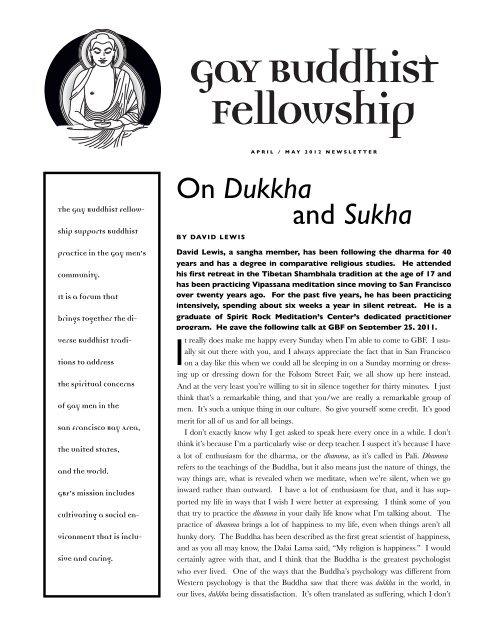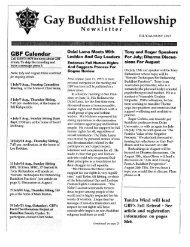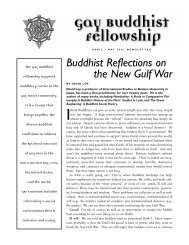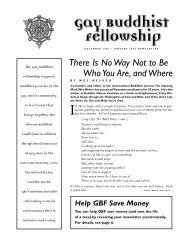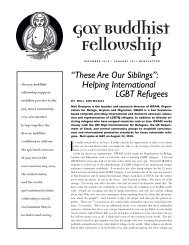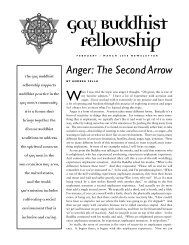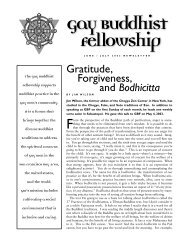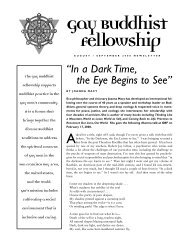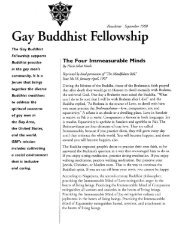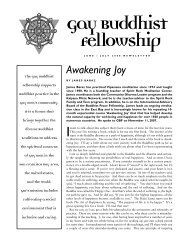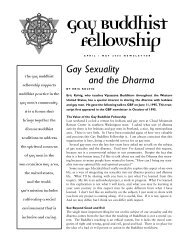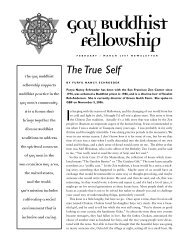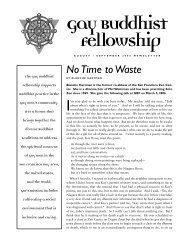2012.04 David Lewis (On Dukkha and Sukha).pdf - Gay Buddhist ...
2012.04 David Lewis (On Dukkha and Sukha).pdf - Gay Buddhist ...
2012.04 David Lewis (On Dukkha and Sukha).pdf - Gay Buddhist ...
You also want an ePaper? Increase the reach of your titles
YUMPU automatically turns print PDFs into web optimized ePapers that Google loves.
APRIL / MAY 2012 NEWSLETTERThe <strong>Gay</strong> <strong>Buddhist</strong> Fellowshipsupports <strong>Buddhist</strong>practice in the <strong>Gay</strong> men’scommunity.It is a forum thatbrings together the diverse<strong>Buddhist</strong> traditionsto addressthe spiritual concernsof <strong>Gay</strong> men in theSan Francisco Bay Area,the United States,<strong>and</strong> the world.GBF’s mission includescultivating a social environmentthat is inclusive<strong>and</strong> caring.<strong>On</strong> <strong>Dukkha</strong><strong>and</strong> <strong>Sukha</strong>BY DAVID LEWIS<strong>David</strong> <strong>Lewis</strong>, a sangha member, has been following the dharma for 40years <strong>and</strong> has a degree in comparative religious studies. He attendedhis first retreat in the Tibetan Shambhala tradition at the age of 17 <strong>and</strong>has been practicing Vipassana meditation since moving to San Franciscoover twenty years ago. For the past five years, he has been practicingintensively, spending about six weeks a year in silent retreat. He is agraduate of Spirit Rock Meditation’s Center’s dedicated practitionerprogram. He gave the following talk at GBF on September 25, 2011.It really does make me happy every Sunday when I’m able to come to GBF. I usuallysit out there with you, <strong>and</strong> I always appreciate the fact that in San Franciscoon a day like this when we could all be sleeping in on a Sunday morning or dressingup or dressing down for the Folsom Street Fair, we all show up here instead.And at the very least you’re willing to sit in silence together for thirty minutes. I justthink that’s a remarkable thing, <strong>and</strong> that you/we are really a remarkable group ofmen. It’s such a unique thing in our culture. So give yourself some credit. It’s goodmerit for all of us <strong>and</strong> for all beings.I don’t exactly know why I get asked to speak here every once in a while. I don’tthink it’s because I’m a particularly wise or deep teacher. I suspect it’s because I havea lot of enthusiasm for the dharma, or the dhamma, as it’s called in Pali. Dhammarefers to the teachings of the Buddha, but it also means just the nature of things, theway things are, what is revealed when we meditate, when we’re silent, when we goinward rather than outward. I have a lot of enthusiasm for that, <strong>and</strong> it has supportedmy life in ways that I wish I were better at expressing. I think some of youthat try to practice the dhamma in your daily life know what I’m talking about. Thepractice of dhamma brings a lot of happiness to my life, even when things aren’t allhunky dory. The Buddha has been described as the first great scientist of happiness,<strong>and</strong> as you all may know, the Dalai Lama said, “My religion is happiness.” I wouldcertainly agree with that, <strong>and</strong> I think that the Buddha is the greatest psychologistwho ever lived. <strong>On</strong>e of the ways that the Buddha’s psychology was different fromWestern psychology is that the Buddha saw that there was dukkha in the world, inour lives, dukkha being dissatisfaction. It’s often translated as suffering, which I don’t
<strong>On</strong>e of the ways that that theBuddha’s psychology was differentfrom Western psychology isthat the Buddha saw that therewas dukkha in the world, in ourlives, dukkha being dissatisfaction.It’s often translated as suffering,which I don’t think is avery good translation. <strong>Dukkha</strong> isdissatisfaction, wanting things tobe other than they are. But theBuddha also taught that there issukha. The opposite of dukkha issukha. <strong>Sukha</strong> is happiness.think is a very good translation. <strong>Dukkha</strong> is dissatisfaction,wanting things to be other than they are. But the Buddhaalso taught that there is sukha. The opposite of dukkha issukha. <strong>Sukha</strong> is happiness.So our lives are this balance of dukkha <strong>and</strong> sukha. Everythingwe do <strong>and</strong> every moment of our day is some balanceof dukkha <strong>and</strong> sukha, <strong>and</strong> it’s not like we can get rid of all thedukkha in our lives <strong>and</strong> just have sukha, which is a lovelythought. Nor can we only live in dukkha. Sometimes whenthings aren’t going well, we can be okay with that. So forthe Buddha <strong>and</strong> the Buddha’s teaching, happiness is a fundamentalcondition. It’s something that is part of our Buddhanature, according to the Mahayana tradition. It’s somethingthat you all have right now. It always exists; it’s justcovered up. So getting at tranquility <strong>and</strong> sukha, happiness inyour life, is a matter of uncovering. Happiness comes fromsukha, <strong>and</strong> sukha comes from acceptance of the moment as itis. A gratitude for the moment as it is, even if the momentis not perfect. In the West, we tend to think of happiness assomething that needs to be pursued or gotten. In the West,we tend to view our dukkha, our dissatisfaction, as somethingthat’s missing. There’s a sense of lack. And in order totransform that dukkha, that dissatisfaction, into sukha, intohappiness, we need to go get something: we need to getpossessions, we need to find the right relationship, the rightjob, the right apartment, whatever we need to change tomake things better. And the Buddha really tried to steer usaway from that idea, that happiness is someplace other thanwhere we are.The relentless pursuit of happiness that we all do in oureveryday lives takes two different forms in terms of our activity.<strong>On</strong>e is looking for pleasure, looking for the thing, theperson, the job, the activity that’s going to make us feel better,<strong>and</strong> the other is turning away from our dukkha, turningaway from whatever is making us uncomfortable. It couldbe that we’re turning away from really big issues, like relationships<strong>and</strong> jobs, or it could be really small things. I did aretreat with a group of Theravada monks earlier this spring.<strong>On</strong>e of the monks just delighted me by providing an example<strong>and</strong> a definition of dukkha which just resonated for me.This monk said, “<strong>Dukkha</strong> is dirty glasses.” For those of youwho wear glasses, you all know that all of a sudden you noticethere’s a smudge on your glasses, <strong>and</strong> you might nothave a h<strong>and</strong>kerchief or something to wipe it off, but as soonas you notice it, it drives you nuts until you fix it. Chancesare you’ve been sitting around for half a day with thatsmudge on your glasses, <strong>and</strong> it’s been okay until you noticedit. That’s dukkha. Our lives are full of dukkha. So when theBuddha taught that dukkha is a condition of life, he’s notsaying we’re all miserable all the time, or that we’re all sufferingall the time—that terrible word, suffering—it’s justthat one thing after another that needs to be fixed, orchanged or altered. And our efforts at fixing, changing oraltering dukkha so that we get some sukha or at least somerelief, take the form of what the Buddha called craving: “Iwant things to be different; I want more of this; I want lessof that.” So this constant cycle of noticing things are a littlebit wrong—dirty glasses, bad job, unsatisfactory relationship—<strong>and</strong>trying to either turn away from it or grab somethingthat’s better, is what’s called samsara. It’s the wheel ofsuffering that we’re all on, that we’re running on like hamstersfor our entire lives. And the Buddha’s teaching, theBuddha’s path, is how to get off the wheel of samsara, howto step off the wheel.Which is easier said than done, for those of you who havea practice or have even thought about it <strong>and</strong> tried to do it,because a lot of those activities that we’ve come up withover the course of our lives to turn away from our dukkha, orto find sukha, don’t really serve us well. Sometimes they justadd to our dukkha, add to our dissatisfaction. And the factthat we’re always looking, that this craving is always cravingsomething different—this craving for change is always present—leadsto a whole set of behaviors that can becomeaddictive. I actually think we all have addictions of some2 G B F A P R I L / M AY 2 0 1 2 N E W S L E T T E R
sort, <strong>and</strong> our addictions are our ways of turning away fromthe present moment in order to feel better or have somethingmore. So the Buddha’s path invites us to look at ourown experience <strong>and</strong> see what’s going on. And if we coulddo that in a non-judgmental way, we have some opportunityto change our patterns. The things that we do to turn awayfrom our experience in Pali are called samkharas, <strong>and</strong>samkharas are to a certain extent like our ordinary neuroses.They are just our habits, our patterns, our ways in which wedeal with sadness, <strong>and</strong> the ways we deal with our happinessin our lives. It’s our ways of dealing with the world that areunique to each of us, called samkharas. So when we meditate<strong>and</strong> especially if we have an opportunity to meditate for acouple of hours a day or have the opportunity to do a retreat,as many of you did last weekend, we have time to justsit in silence <strong>and</strong> see what arises without turning away. Ittakes a lot of courage to see what arises without turningaway. We can see our samkharas; we can see our patterns.So it takes a lot of courage to be a practitioner. It meansbeing open to whatever comes up without turning awayfrom it. And that’s not so easy.<strong>On</strong>e of my favorite monastic teachers, Ajahn Sumedo,talks about it as st<strong>and</strong>ing under whatever experience you arehaving. It might be a negative experience. You might havelost somebody close to you, <strong>and</strong> you might be experiencinggrief, or you might have lost a job, or you might have lostyour stock portfolio. Ajahn Sumedo talks about relating tothat experience by st<strong>and</strong>ing under it, like st<strong>and</strong>ing underneatha water fall. If you’re feeling grief, instead of turningaway from it, try to just st<strong>and</strong> there <strong>and</strong> feel the grief, <strong>and</strong>The relentless pursuit of happinessthat we all do in our everyday lives takes two differentforms in terms of our activity.<strong>On</strong>e is looking for pleasure,looking for the thing, the person,the job, the activity that's goingto make us feel better, <strong>and</strong> theother is turning away from ourdukkha, turning away from whateveris making us uncomfortable.watch what happens to it. And the wonderful thing, usually,that we end up seeing is that it’s impermanent. If we st<strong>and</strong>under any experience, happy or unhappy, long enough, itchanges. So one of the things our samkharas—our habits oflife—cause us to do is to turn away from experiences thatare unpleasant, just automatically. We turn away: we reada book, or we have a drink, or we get something to eat, orwe turn on the TV. And pleasant experiences we latch onto, we grasp. Both are aspects of what the Buddha calledcraving, <strong>and</strong> the Buddha recommends that we just be withwhat’s happening <strong>and</strong> appreciate it for its own nature <strong>and</strong>realize that it’s going to be temporary. For the longest time,that practice was a real challenge for me because I have akind of samkhara of my own, especially being judgmental ofmyself. So for the longest time when I started sitting at longretreats <strong>and</strong> regularly at home <strong>and</strong> I’d see stuff come up, I’dsay, “Oh, that’s not very nice; I need to change that,” whichof course just caused me to shut the door again <strong>and</strong> get buried.So the idea is to be able to see your own stuff as itcomes up <strong>and</strong> not be judgmental of it, to know that this isthe result of causes of conditions, <strong>and</strong> you probably hadvery good reason for coming up with this defense or habit.At some time in your life, it served you well. But recognizethat right now it’s not serving you quite as well, <strong>and</strong> maybeit’s something you can let go of. If we see it enough times,we can do it.So the challenge is to remain open to whatever happenswithout seeking the solid forms, without trying to make itsolid. That’s usually what we do when something is good inour lives. Or on the other h<strong>and</strong>, remain open without seekingquick solutions to feel safe, which is of course what wedo. If something scary happens, we reactively do what weneed to do to feel safe.So I have this poem by Hafiz that speaks to this somewhat.I really love it. It’s called “Cast all Your Votes forDancing.”I know the voice of depressionStill calls to you.I know those habits that can ruin your lifeStill send their invitations [samkharas]But you are with the Friend nowAnd look so much stronger.You can stay that wayAnd even bloom!Keep squeezing drops of the SunFrom your prayers <strong>and</strong> work <strong>and</strong> musicAnd from your companion’s beautiful laughter.GBF APRIL / MAY 2012 NEWSLETTER 3
Keep squeezing drops of the SunFrom the sacred h<strong>and</strong>s <strong>and</strong> glance of your BelovedAnd, my dear,From the most insignificant movementsOf your own holy body.Learn to recognize the counterfeit coinsThat may buy you just a moment of pleasure,But then drag you for daysLike a broken manBehind a farting camel.You are with the Friend now.Learn what actions of yours delight Him,What actions of yours bring freedomAnd Love.Whenever you say God’s name, dear pilgrim,My ears wish my head was missingSo they could finally kiss each otherAnd applaud all your nourishing wisdom!O keep squeezing drops of the SunFrom your prayers <strong>and</strong> work <strong>and</strong> musicAnd from your companion’s beautiful laughterAnd from the most insignificant movementsOf your own holy body.Now, sweet one, be wise.Cast all your votes for Dancing!So, not to change subject, but I had kind of a nice intellectualsurprise a couple of months ago. I was reading this wonderfulbook by Sarah Bakewell called How to Live, or a Life of Montaigne, akind of biography of the French essayist. Montaigne lived in the17th century in France. And he wasn’t really a philosopher. Ifhe lived today he’d be a blogger. He sat in this tower all dayevery day <strong>and</strong> wrote whatever was passing through his mind <strong>and</strong>left voluminous volumes of journals. And ever since the 17thcentury, he has come <strong>and</strong> gone out of fashion, <strong>and</strong> he’s comingback into fashion now. He’s a lot of fun to read; the guy’s veryamusing. But one of the things I learned reading this book wasthat Montaigne had a classical education, which meant he wasraised in school where they were speaking classical Greek <strong>and</strong>Latin. So there’s a whole section in the book about the Greekphilosophers that he appreciated. I’m reminded that I haven’thad Greek philosophy since maybe my freshman year in college.The classical Greek philosophers that we all know best, tended tobe metaphysicians. The Buddha particularly supports metaphysicalphilosophy, but there was this whole different group ofGreek thinkers that were also called philosophers, but they werereally scientists of life. They were like Montaigne, interested inthe question, “How do you live?” There were three majorschools of Greeks: the stoics, the Epicureans <strong>and</strong> the skeptics,<strong>and</strong> I’m not going to go into detail about all of them, but thesewere the three schools of Greek philosophy that looked at thisquestion of how we should live <strong>and</strong> tried to answer it. They allhad different bents on it, but there’s one general path that they allseem to agree on. Being a dharma person, I really appreciate it.The best path that they seem to agree on to happiness, which inGreek—those of you who are Greek will forgive me my Greekpronunciation—is eudaemonia. The best path to happiness isthrough equanimity. Have you ever heard that before? Thepath to happiness is through equanimity. How do you get equanimity?Equanimity is achieved through the practice of mindfulness.Wow! I always thought the Greeks were diametricallyopposed. I think of rationalism, a kind of fundamental basis forthe whole philosophical Western culture, which is in so manyways different from Eastern culture, as coming from the Greeks.And here I find a bunch of Greeks who were pretty much teachingthe same things as the Buddha was at the same time. In fact,when I talked to one of my dharma teachers about this—I said,“I just discovered the coolest thing about the Greeks”—he taughtme that Hero, who founded the Greek school of skepticism, wasin the entourage of Alex<strong>and</strong>er the Great <strong>and</strong> spent a good dealof time in Northern India at the time or shortly after the time ofBuddha. So there was this cross-fertilization of Western <strong>and</strong>Eastern cultures in 300 BC. So I’m not necessarily saying thatthe Greeks got their ideas from the Buddha, but you knowdharma is dharma, <strong>and</strong> it’s universal. It doesn’t matter who saysThis constant cycle of noticingthings are a little bit wrong—dirtyglasses, bad job, unsatisfactory relationship—<strong>and</strong>trying to eitherturn away from it or grab somethingthat's better, is what's calledsamsara. It's the wheel of sufferingthat we're all on, that we're runningon like hamsters for our entirelives. And the Buddha's teaching,the Buddha's path, is how toget off the wheel of samsara, howto step off the wheel.4 G B F A P R I L / M AY 2 0 1 2 N E W S L E T T E R
it. You get the same thing from Native Americans who had noaccess to the Buddha, but the dharma is the dharma. It reallypleased me to get the same lessons from the Greeks.The motto of the school of the skeptics, Hero’s motto, is “Isuspend judgment.” The skeptics believed that the judgments,for even simple views <strong>and</strong> opinions, were so subjective that theyshould really be kept to yourself because mine are differentfrom yours, <strong>and</strong> if you do share views <strong>and</strong> opinions, you shouldbe deeply respectful of the fact that there’s no such thing as anabsolutely true view or opinion. It’s always subjective. TheBuddha certainly believed this also, <strong>and</strong> taught that one of theprimary forms of craving is views <strong>and</strong> opinions. Our views<strong>and</strong> opinions are something that we attach ourselves to. Theybecome me, mine. They support our sense of self, <strong>and</strong> arefundamentally disrespectful of anyone who thinks otherwise.So I wanted to go off on that idea a little, on views <strong>and</strong> opinions,then get some of your views <strong>and</strong> opinions. We have anelection year coming up. I don’t know about you, but I’mhearing a lot of views <strong>and</strong> opinions. It’s really interesting towatch my own reaction <strong>and</strong> my own stuff come up. You mighthave heard this from me before, but I periodically take newsholidays where I just stay away from the news. I cancel thenewspapers but I still get the Sunday New York Times because Ilike the book review <strong>and</strong> the entertainment section. But thismorning I got my New York Times <strong>and</strong> I started looking at it <strong>and</strong>became immediately pissed off. So after a couple of articlesbecause today I was giving a dharma talk <strong>and</strong> I was trying tobe mindful <strong>and</strong> be in the moment, I needed to put that away.I don’t watch CNN; I don’t watch Fox News. It’s not because Idisagree with everybody but one of the things I notice is that ifyou turn off the sound <strong>and</strong> watch a little bit of Fox News, orCNN, you get the same thing, you get the same message. Youget agitated people talking a lot. So the Buddha didn’t say,“Don’t have views <strong>and</strong> opinions.” He did advocate for what hecalled discernment, so that in any given circumstance, includingpolitics, the Buddha would say evaluate the situation, dowhat you can do, <strong>and</strong> don’t fret about it, because most of thepain that we cause ourselves in politics is purely internal. MichelleBachman doesn’t annoy you. You annoy yourself inresponse to Michelle Bachman. It’s a really useful distinction tolook at in your practice because part of what craving is about isblaming our mood on somebody else: my partner, my job, myMichelle Bachman. Did you notice what came up when Imentioned Michelle Bachman? We all have a response, <strong>and</strong> ina different group, Barack Obama would produce the sameresponse. So what I’m trying to end with, <strong>and</strong> I hope I’m doingthis skillfully, is to get us to pay attention to our response<strong>and</strong> how we create our own suffering by that response, becauseSo the idea is to be able to seeyour own stuff as it comes up <strong>and</strong>not be judgmental of it, to knowthat this is the result of causes ofconditions, <strong>and</strong> you probably hadvery good reason for coming upwith this defense or habit. Atsome time in your life, it servedyou well. But recognize that rightnow it’s not serving you quite aswell, <strong>and</strong> maybe it’s something youcan let go of. If we see it enoughtimes, we can do it.I think there’s going to be a lot of opportunity for creating sufferingcoming up, if it hasn’t already started in this electionyear. It doesn’t have to happen. We can act with discernment.We can do the right thing. We can be engaged <strong>Buddhist</strong>s, butwe don’t have to sit around grinding our teeth.I just wanted to remind you of this before I end. Bill Weberwas here about a month ago, <strong>and</strong> for those who were here, heused a really poignant metaphor that I just wanted to remindyou of. It was a story about the Vietnamese boat people afterthe Vietnam War when they were evacuating people, <strong>and</strong> peoplewere trying to get away, <strong>and</strong> there were hundreds if notthous<strong>and</strong>s of over-loaded boats trying to get out to the Americanwarships, trying to escape. And the boats were all overloadedbecause as soon as a boat would leave the beach, peoplewould swim out <strong>and</strong> climb on it, <strong>and</strong> the boats were turningover <strong>and</strong> people were panicking <strong>and</strong> jumping up <strong>and</strong> down<strong>and</strong> waving their arms. Bill had read a story someplace <strong>and</strong>quoted it here at GBF about someone noticing that if a boathad one calm person on it, just one person not panicking, thatboat was much more likely to make it. That person might havebeen quietly bailing water while everyone else was jumping up<strong>and</strong> down, waving their arms, excited, but if there’s one calmperson in the boat, the merit of their practice impacted everyoneelse on the boat, <strong>and</strong> they were more likely to make it.That story really stuck with me. So I just want to encourage usas practitioners, or <strong>Buddhist</strong>s, or just citizens of the world, totake the opportunity to be the one calm person in the boat forwhatever is coming up. And who knows what’s coming up?GBF APRIL / MAY 2012 NEWSLETTER 5
GBFSteering CommitteeRay DyerRoy KingMichael MurpheyMarvin SnowCarl WolfTreasurerTeng-How BaeSUNDAY SITTINGSProgram CommitteeBaruch GoldenJerry JonesShantanu PhukanJim StewartFacilitator CoordinatorRay DyerFacilitatorsTom BrueinOswaldo GarciaJoe GoodeRoy KingMichael MurpheyJeff LindemoodHost CoordinatorKei MatsudaHostsRichard AzzoliniCass BraytonJim ChristrupJay CorbettMark HoffheimerTage LiljaDave LimcacoJerry MartinKei MatsudaRoger PinnellJim StewartNEWSLETTEREditorMichael LangdonTranscribersMichael AltshuleGary OstTony PasquaJim StewartDesign / LayoutMichael GabelMailing ListBill HurleyMarvin SnowNewsletter MailingJack BusbyMailRichard AzzoliniLARKIN STREET YOUTH CENTERVolunteer CoordinatorClint SeiterPRISON OUTREACHCoordinatorBaruch GoldenWEBSITEJoe KukulkaYAHOO GROUP MODERATORGeorge HubbardSOUND / RECORDINGSGeorge HubbardYour Thrift StoreDonations Earn Money for GBFGBF members can donate their quality cast-offs to the CommunityThrift Store (CTS) <strong>and</strong> GBF will receive a quarterly check basedon the volume of items sold This is a great way to support ourSangha, <strong>and</strong> the community So far this year we have received over$800 through members’ generosity Bring your extra clothing <strong>and</strong>other items to CTS at 623 Valencia St between 10am <strong>and</strong> 5pm,any day of the week The donation door is around the corner onSycamore Alley (parallel to <strong>and</strong> between 17th <strong>and</strong> 18th) betweenValencia <strong>and</strong> Mission Tell the worker you are donating to GBFOur ID number is 40. Information: (415) 861-4910.How to Reach Uswww.gaybuddhist.orgFor general questions about GBF write to:inquiry@gaybuddhist.orgTo contact Program Committee with suggestions for speakers <strong>and</strong> comments:gaybuddhist.org/programsMail correspondence:GBFPMB 4562215-R MARKET STREETSAN FRANCISCO CA 94114Address changes or to subscribe or unsubscribe to the newsletter:www.mailinglist@gaybuddhist.orgGBF Newsletter Send submissions to:editor@gaybuddhist.orgGBF Yahoo Discussion GroupThere is now a GBF discussion group for the general membership (<strong>and</strong> others)on Yahoo Join the discussion at:www.groups.yahoo.com/group/gaybuddhistfellowshipRETREAT COORDINATORMichael Murphy6 G B F A P R I L / M AY 2 0 1 2 N E W S L E T T E R
CalendarSunday Sittings10:30 am to 12 noonEvery Sunday at 10:30am we meditate together for 30 minutes,followed by a talk or discussion till 12 noon Everyone is thenwelcome to stay <strong>and</strong> socialize over refreshments till approximately12:30, after which those who are interested usually gosomewhere local for lunch. Our sittings are held at the SanFrancisco <strong>Buddhist</strong> Center, 37 Bartlett Street (Look for the reddoor near 21st St between Mission <strong>and</strong> Valencia Streets)MUNI: 14 Mission or 49 Van Ness-Mission, alight at 21st St, walk1/2 block BART: 24th <strong>and</strong> Mission, walk 31/2 blocks PARK-ING: on street (meters free on Sundays) or in adjacent NewMission Bartlett Garage The Center is h<strong>and</strong>icapped accessible.Sunday SpeakersApril 1 Jerry MartinJerry has been attending the GBF since 2008. He was an ERdoctor for over twenty years <strong>and</strong> now works in an urgent caresetting. In between, he graduated from Pacifica Graduate Institutewith a masters in counseling with an emphasis on depthpsychology. His thesis looked at resilience among the generationsof men who came out together following Stonewall. Asan MFT, he has done individual counseling <strong>and</strong> led groups forHIV-positive men, bereavement <strong>and</strong> cancer support. Havinghad a life full of challenges <strong>and</strong> (mis)adventures, he will speak ofhis own resilience <strong>and</strong> how he views this as a part of his <strong>Buddhist</strong>path.April 8 Jim Stewart onBuddha/Jesus/EasterIn honor of Easter, longtime GBF member Jim Stewart willshare aspects of his experience integrating the teachings ofJesus <strong>and</strong> the Buddha.April 22 Tova GreenTova Green began sitting at the San Francisco Zen Center in1990 after many years of Vipassana practice. She became aresident there in 1999 <strong>and</strong> was ordained as a priest in 2003 byEijun Linda Cutts. Tova co-founded the Queer Dharma Groupat the Center <strong>and</strong> is currently the Director of the San FranciscoZen Center's City Center.April 29 Open DiscussionMay 6 Elia <strong>and</strong> Halima Van TuylElia <strong>and</strong> Halimah Van Tuyl have been married for over 40 years,raised a family of four daughters in Palo Alto, <strong>and</strong> since 2005,turned their attention to problems of poverty among childrenin Cambodia. As co-founders of Friends of Cambodia, theyhave travelled many times to Asia to develop <strong>and</strong> fund programsfor children who had been working <strong>and</strong> living at theinfamous Steung Meanchey garbage dump close to PhnomPenh. Their current focus is on the Cambodia Scholars Program,which aims at providing disadvantaged Cambodian youthwith adequate education <strong>and</strong> training to successfully transitioninto adulthood without falling back into poverty. Details oftheir program <strong>and</strong> a link to a blog may be found atwww.friendsofcambodia.org.May 13 Heather SundbergHeather Sundberg began teaching meditation in 1999 primarilyto youth <strong>and</strong> families. She has completed the four-year SpiritRock/Insight Meditation Society teacher training <strong>and</strong> continuesto be mentored by Jack Kornfield. She is also a graduate of theSpirit Rock Community Dharma Leaders program (CDL2). Sheheld the position of Spirit Rock Family Program teacher <strong>and</strong>manager from 2001-2010. Currently she teaches classes, daylongs,<strong>and</strong> retreats throughout California, especially at SpiritRock, <strong>and</strong> through the Mountain Stream Meditation Centercommunity. She brings to her teaching a passion for the depthof retreat practice, combined with a playful creativity for integratingthe teachings into daily life.May 20 Open DiscussionApril 15 Jana Drakka“Gengetsu Junsei” received Dharma Transmission in the SotoZen <strong>Buddhist</strong> Lineage from Zenkei Blanche Hartman, the firstwoman in this lineage. Jana’s nonprofit organization, JanaDrakka’s Community Services, provides a wide range of servicesincluding support groups, workshops, classes <strong>and</strong> talks. Jana’scommunity work is based in Harm Reduction Principles—a wayto meet everyone with complete acceptance—<strong>and</strong> allows for aclient-centered modality. Among her many activities, Jana leads ameditation group at Glide Memorial Church on Monday evenings.She also facilitates an ongoing peer support group forcase managers at Tenderloin Housing Clinic, where she runs amindfulness group <strong>and</strong> a grief/stress support group <strong>and</strong> givesone-on-one counseling to staff <strong>and</strong> clients.May 27 Daigon GaitherDaigan Gaither began <strong>Buddhist</strong> practice in 1995 as a Vipassanapractitioner <strong>and</strong> began to study Zen in 2003 with PaulHaller. He received Lay Ordination in 2006 <strong>and</strong> became aresident of San Francisco Zen Center in 2008, where hecurrently lives <strong>and</strong> is in training to be a Priest. His work <strong>and</strong>practice include many hours devoted to community serviceas one of the Sisters of Perpetual Indulgence (since 1995)<strong>and</strong> a volunteer caregiver with Zen Hospice Project (since2003). Daigan is a full-time student working towards agraduate degree in <strong>Buddhist</strong> Studies to become board certifiedas a chaplain. He is also the co-facilitator of San FranciscoZen Center's Queer Dharma, which meets once amonth on Saturday afternoons.GBF APRIL / MAY 2012 NEWSLETTER 7
GBF NEWSLETTER PMB 456 2215-RMARKET STREET SAN FRANCISCOCA 94114 ADDRESS SERVICE RE-QUESTEDBy the power <strong>and</strong> truth of this practice, may allbeings have happiness <strong>and</strong> the causes of happiness,may all be free from sorrow <strong>and</strong> the causesof sorrow, may all never be separated from thesacred happiness which is without sorrow, <strong>and</strong>may all live in equanimity, without too much attachmentor too much aversion, believing in theequality of all that lives.—GBF Dedication of Merit


